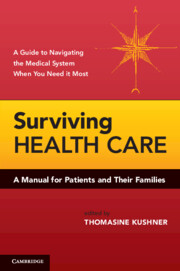Book contents
- Frontmatter
- Contents
- Contributors
- Preface
- 1 Letter to Patients
- 2 Becoming an Active Member of Your Health Care Team
- 3 Information That Will Help You with Advance Planning for Your Health Care
- 4 Responding to Medical Emergencies
- 5 What You Need to Know about Medical Errors
- 6 Being Informed When You Give Consent to Medical Care
- 7 Beware of Scorecards
- 8 Transplantation 101
- 9 When the Illness Is Psychiatric
- 10 On the Horizon
- 11 To Be or Not to Be – A Research Subject
- 12 Information That Will Help You Make Health Care Decisions for Adult Family Members
- 13 Caring for Individuals with Alzheimer's Disease
- 14 When the Patient Is a Child
- 15 Care of Elders
- 16 Being and Thinking
- 17 A Patient's Guide to Pain Management
- 18 The Hardest Decisions
- 19 What You Need to Know about Disasters
- 20 Making the Internet Work for You
- Appendix: Patient Individual Profile
- Index
2 - Becoming an Active Member of Your Health Care Team
Published online by Cambridge University Press: 05 June 2012
- Frontmatter
- Contents
- Contributors
- Preface
- 1 Letter to Patients
- 2 Becoming an Active Member of Your Health Care Team
- 3 Information That Will Help You with Advance Planning for Your Health Care
- 4 Responding to Medical Emergencies
- 5 What You Need to Know about Medical Errors
- 6 Being Informed When You Give Consent to Medical Care
- 7 Beware of Scorecards
- 8 Transplantation 101
- 9 When the Illness Is Psychiatric
- 10 On the Horizon
- 11 To Be or Not to Be – A Research Subject
- 12 Information That Will Help You Make Health Care Decisions for Adult Family Members
- 13 Caring for Individuals with Alzheimer's Disease
- 14 When the Patient Is a Child
- 15 Care of Elders
- 16 Being and Thinking
- 17 A Patient's Guide to Pain Management
- 18 The Hardest Decisions
- 19 What You Need to Know about Disasters
- 20 Making the Internet Work for You
- Appendix: Patient Individual Profile
- Index
Summary
You wouldn't be reading this book if you were perfectly happy with the health care you are receiving and the system that delivers it to you. The U.S. health care system is vexing and frustrating to physicians, nurses, and patients alike. Worse yet, many of our most important health outcomes are dramatically inferior to those of other Western nations that spend much less on health care.
Social, cultural, and legal factors indigenous to the United States have produced a unique health care system comprising many competing insurers and plans, each with its own bureaucracy. At its best, our health care is unsurpassed, but when examined across the entire American population, it's severely flawed. About 15% of the U.S. population has no health insurance whatsoever, yet when members of this group become ill (sometimes when a disease has progressed further than it might have if medical attention had been readily available), they receive care too, and someone must pay for that care. Moreover, most (but not all) health insurance plans reimburse at proportionately higher levels of health care for the highest “acuity” (e.g., surgical procedures, intensive care) of disease. This creates a system that rewards surgery and care for the sickest patients, rewards the outpatient management of disease less, and sometimes even provides disincentives for providing preventive health care. Consequently, fewer and fewer U.S. medical school graduates are choosing careers in primary care, and those primary care physicians in practice are pushed to the limit.
- Type
- Chapter
- Information
- Surviving Health CareA Manual for Patients and Their Families, pp. 13 - 25Publisher: Cambridge University PressPrint publication year: 2010

